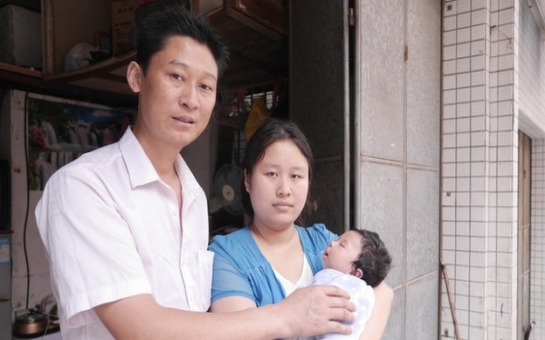Ms Liu and her husband brought their newborn home, but they knew their child was seriously ill.Miaomiao has serious hip and leg deformities. A large hole in her mouth makes it difficult for her to swallow. Now six weeks old, she's clearly losing weight."I wanted to look after Miaomiao myself," Liu Jiaomei, explains, tears streaming down her face. "But my husband asked: what if our daughter dies because we can't care for her?"With no money and no government healthcare, this couple faced a heart-wrenching choice: hold on to their daughter or hand her over to the state where - in theory - she would receive treatment."No-one wants to abandon their child," Miaomiao's father, Lei Zebao says. "But if we gave her away, at least she would have a slim chance at life."They decided to take her to a "safe baby hatch" not far from their home. In January, the hatch opened beside the local orphanage, offering parents a place to anonymously abandon children they couldn't care for.On the evening of 16 March, the couple wrapped their daughter in blankets and travelled to the orphanage gates.Fate intervened. Overwhelmed with sick children, the baby hatch had stopped accepting new babies hours before the family arrived. Miaomiao stayed in her mother's arms."I was secretly hoping they wouldn't take my girl, though I didn't know if we could keep her alive," Liu Jiaomei admits. "I was torn."Pressures remain. The family are living inside a concrete garage space next to a busy road. They're struggling to pay for basics like baby formula and nappies, let alone expensive medical care.Struggle to copeIn March, the closure of Guangzhou's baby hatch drew international attention. In the six weeks the hatch was open, an average of five children a day were dropped off there.In total, 262 children had been surrendered to the state, officials said. All of them had serious health problems, including congenital heart defects and severe cerebral palsy.Some of the children were as old as five or six. Those who work with seriously ill children say that by that age, adults who are caring for children on their own find it difficult to physically lift them. That's when parents often give up, believing local welfare institutes can provide the care they can't.The vast majority of children in Chinese orphanages are seriously ill or they're suffering from a disability that requires special care that poor migrant workers cannot offer."I've never seen a healthy child in a government orphanage," explains Naomi Kerwin, an American expatriate who has worked as a child advocate for years inside China. "But I've seen quite a bit of spina bifida, I've seen cleft palates with heart problems and lots kids with genital issues."To be fair, China has made great strides in maternal and infant health in recent years.Maternal mortality - the likelihood a woman will die during pregnancy or childbirth - has plunged more than 13% a year in China since 1990, the fastest drop in the world according to a new global study from the Institute of Health Metrics and Evaluation at the University of Washington.A related study showed that children in China are also much more likely to live past the age of five than in previous decades.But all of these numbers mean little to poor families who are struggling to keep their children alive, despite empty bank accounts.'I thought of jumping'One desperate father is getting attention for his radical campaign to fund his daughter's medical care.A retired soldier from China's central Sichuan province, Cheng Bangjian regularly parades in Beijing's streets holding a sign that reads: "I will work the rest of my life for anyone who funds my daughter's medical care." Few ever make eye contact with him.Cheng's nine-year-old girl, Siyi, has a blood disorder. Following years of expensive treatment, a bone marrow transplant is her only hope and a donor has been found. The entire family relocated to Beijing because it has the country's only hospital that can treat Siyi's condition. But her parents can't pay for the $96,000 (£57,000) operation."I've already borrowed from all my relatives," Cheng Bangjian weeps. "I've even thought of jumping off a bridge. If I died, my daughter could be saved because more people would care for us."In the future, there is hope that other families won't be driven to the same desperate lengths as Miaomiao's family in Guangzhou and Cheng Siyi's family in Beijing.Some promising initiatives lie on the horizon.Many charitable organisations are trying to address infant health concerns early on, preventing some congenital disabilities by handing out free folic acid to pregnant women, for example. Other groups are trying to reach struggling families with sick or disabled babies, offering them early support to help them care for their children at home.Others in China are lobbying the government to introduce national health insurance for children up to the age of 18. Every year since 2009, children's advocate Melody Zhang has submitted a proposal for a children's health insurance plan to China's parliament through a slew of parliamentary representatives.It's difficult to know what happens to the proposal behind the scenes, explains Ms Zhang, the founder and executive director of Children's Hope Foundation, one of China's largest charitable organisations offering medical help to orphans. However, she's optimistic a plan like the one she's proposing is inevitable."More and more cities are coming up with their own medical insurance plans, so coverage is spreading," she explains. On average, only a few of China's 300 million children would need access to expensive medical care, so her proposal for 100 renminbi (£9.50; $16) annual insurance is realistic, she says.Until then, millions of parents in China are struggling to hold on to their children, while also keeping them healthy.In desperation, nine-year-old Cheng Siyi's family recently took out a shadowy high-interest loan. They needed a $40,000 deposit to fund her bone marrow surgery before time ran out."Of course what we have gone through is worth it," Siyi's father explains. "Once our kid is healthy, she'll grow up just like a normal girl."(BBC)Bakudaily.az
Caring for sick babies: The dilemma facing China's poor
World
23:30 | 19.05.2014

Caring for sick babies: The dilemma facing China's poor
When Liu Jiaomei gave birth to her daughter Miaomiao in March, she was forced to leave the hospital an hour after her labour was over. Ms Liu and her husband, both poor migrant workers, had no money to pay for extra care.
Follow us !










